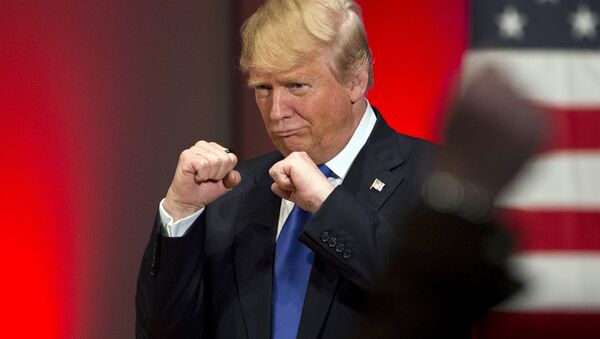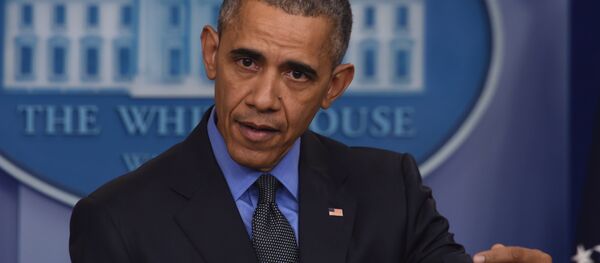In his article for Resalat, a conservative Iranian daily, the journalist called attention to Trump's NATO remarks and his pragmatic approach toward US-Russian relations.
In the course of his election campaign Donald Trump had thrown the much discussed Article 5 of the bloc's founding treaty into question, by saying that Washington would come to its allies' aid only if those nations have "fulfilled their obligations" to the US.
Apparently therefore, Trump's win has prompted some European observers to say that NATO "might not survive a Donald Trump presidency."
At the same time, the US President-elect has repeatedly noted that he "would get along very well with [Russian President] Vladimir Putin."
Last Tuesday the United States expanded sanctions against Russia over the situation in Ukraine, imposing additional individual restrictions on seven Russian citizens and sectorial sanctions on eight Russian entities and two vessels.
On December 23, President Obama signed the National Defense Authorization Act for Fiscal Year 2017 which includes numerous instructions to the Pentagon on how to deal with the so-called "Russian threat."
"It appears that the Authorization Act has been adopted by the outgoing Obama administration, which is hastily introducing new sanctions against Russia, to create problems for the incoming Trump administration and complicate its relations on the international stage, as well as to force it to adopt an anti-Russia policy," Foreign Ministry spokeswoman Maria Zakharova said Tuesday commenting on the legislation.
Yazdani cited Dimirtri K. Simes, a US foreign policy analyst and president of The Center for the National Interest (formerly known as The Nixon Center) and Graham Allison, Director of the Harvard Kennedy School's Belfer Center for Science and International Affairs.
In their recent article entitled "A Blueprint for Donald Trump to Fix Relations with Russia" the scholars warn that the United States and Russia "face a serious risk of stumbling into a war neither side wants."
"You have been elected to change the way Washington does business, and nowhere is that needed more than in dealing with Moscow, the scholars wrote addressing the US President-elect.
The Iranian journalist underscored that Trump's victory and his willingness to cooperate with Russia has opened the door to a serious discussion on the issues which have previously been regarded as "a taboo."
These issues include the necessity "to integrate Russia into an international order that takes into account Moscow's minimum essential interests" and to recognize that Russia "remains a great power," as Simes and Allison highlighted.
"As seen during Obama's second term, when treated primarily as a 'foe,' Russia can undermine important American objectives. If it can be persuaded to act more as a partner, within the framework of a sustainable, if difficult, working relationship, Moscow can help advance US foreign-policy objectives in a number of ways," the scholars underscored.
In this respect Trump's nomination of Rex Tillerson for US Secretary of State speaks volumes, the journalist underscored.
Indeed, analysts believe that Exxon Mobil Chairman and CEO Rex Tillerson will play a vital role as Secretary of State in restoring good relations with Moscow.
"Trump wants better relations with Russia, and Tillerson's intimate knowledge of the state of their oil industry puts him in a position of strength when he negotiates with them," Robert Waters, the Ohio Northern University Assistant Professor of History, told Sputnik on December 15.
However, Yazdani admitted that Trump's efforts to mend fences with Russia are likely to be opposed by US elites and some of America's European allies.
In light of this Simes and Allison offer Trump "to make [his] case directly to the American people-something [he has] done many times during the campaign," expressing hope that Americans will move beyond "the wishful thinking that has thus far prevented the United States from effectively pursuing its real national interests."





